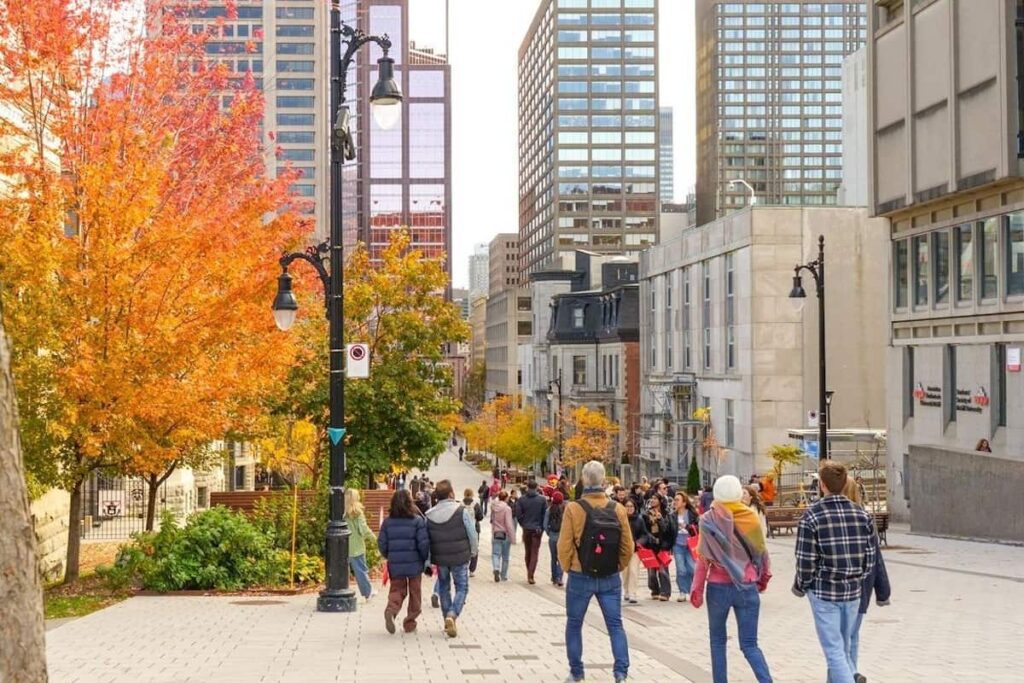Four Canadian cities made it to a new global ranking of best destinations for international students.
Montreal, Toronto, Vancouver, and Ottawa were all listed in global higher education experts Quacquarelli Symonds’ (QS) Best Student Cities 2026 top 100 ranking.
Discover your options to study in Canada
The cities and their rankings can be found below:
| Canadian City | QS Best Student Cities 2026 Ranking |
| Montreal | |
| Toronto | 22 |
| Vancouver | |
| Ottawa |
Montreal
The largest city in Quebec has consistently been ranking as Canada’s top-performing city on QS’s global Best Student Cities list.
This year it ranked highly among Student View (94.4) and Student Mix (91.5) categories.
While it was also positively viewed for its Employer Activity (80) and Desirability (74.8), its Affordability level fell to 30.5, its lowest by far, compared to other categories.
Montreal is home to McGill University, which was the top Canadian university in the 2026 QS World University Rankings. It was in the 27th position globally.
Montreal ranked 10th place in the QS Best Student Cities 2025 list, making this a marked decline as compared to previous years.
Toronto
Canada’s largest city ranked 22nd in the QS Best Student Cities 2026 list.
Toronto excelled in Student View (93.1), Student Mix (91.8) and also did well in Employer Activity (85.6), and Desirability (82.4) categories too.
Like Montreal, it scored low on Affordability (17.4).
Toronto features a number of top-notch educational institutions. University of Toronto was the second highest Canadian university in the QS World University Ranking for 2026, coming in the 29th position globally. York University, also in Toronto, ranked in the 333rd position.
Toronto held the 11th position in the QS Best Student Cities 2025 list, also marking a big decline this year.
Vancouver
The bustling city in British Columbia ranked highly in Student Mix (91.8).
While it also fared well in other categories like Student View, Employer Activity, and Desirability, its score in Affordability (16.9) brought its overall score down.
Vancouver regularly ranks as Canada’s most expensive city. According to moving company MovingWaldo, the cost of living in Vancouver is $3,793.63 per month in 2025.
Vancouver is home to University of British Columbia, which was the third highest ranked Canadian university in the QS World University rankings, coming in the 40th position globally.
Simon Fraser University, which was listed in the 308th place, is also located in Vancouver.
Ottawa
The capital of Canada also made the list, ranking well in Student View (80.3), Student Mix (82.3) and Desirability (73.6).
However, its scores in Employer Activity (35.6) and Affordability (22.1) and Rankings (27.4) pulled the overall score down.
The University of Ottawa ranked in the 218th position in the QS World University Ranking 2026.
Overall Ranking
In total, most North American cities have seen a decline in the QS Best Student City rankings, as compared to the previous year.
Canadian cities have seen drops in Student Mix and Desirability categories, although QS points out that declines in the United States have been more severe in these indicators.
Methodology
The QS Best Student Cities evaluates cities across six key categories:
University rankings: Considers the number of universities a city has that are featured in the QS World University Rankings, as well as how those institutions performed in the most recent edition of the rankings.
Student mix: The category measures the proportion of students in the city’s population, the number of international students enrolled, and the overall inclusivity of the city and its country.
Desirability: City safety, pollution levels, and student survey responses indicating interest in studying there.
Employer activity: This category assesses youth employment rates in the city and employer perceptions of local university graduates.
Affordability: This looks at tuition and cost of living in the city.
Student view: This captures how students ranked the city based on its friendliness, sustainability, diversity, and the proportion that wishes to continue living there after graduation.
To be eligible for inclusion, a city must have a population exceeding 250,000 and host at least two universities featured in the latest QS World University Rankings.
Studying in Canada
There are many benefits to pursuing higher education in Canada, including its top-notch universities.
If you’re thinking about pursuing education in Canada as an international student, there are some things to keep in mind:
- Only Designated Learning Institutions (DLIs) are permitted to admit international students, so it’s important to select a program from the federal government’s approved list.
- Once you apply and gain admission to your chosen institution, you’ll receive a Letter of Acceptance. This document, along with others like proof of financial support, is necessary when applying for a study permit.
- You will need to show proof of financial support. The amount of funds required changes according to the size of your family. Starting September 1, 2025, it is $22,895 for a family of one.
- Other documents you need to acquire include the Provincial Attestation Letter or Territorial Attestation Letter. You may also need to provide biometrics, undergo a medical exam, or provide police certificates.
- There have been numerous changes to post graduation work permit (PGWP) and spousal open work permit (SOWP) eligibility over 2024 and 2025. Be sure to stay up-to-date with the most recent eligibility criteria, if these factors are important to you.

